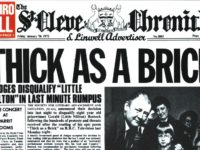If prog rock was once about pushing at the boundaries of music, then Ian Anderson asserts that those days have come to a definitive end. Moreover, if his band Jethro Tull was once considered a prog-rock outfit, he’s at a loss as to why.
Anderson says, with brutal frankness, that music fans have an over-inflated idea about what’s still possible these days. In a way, his own solo career is mirroring this sense of acceptance, as Anderson has twice returned to the Tull-era Gerald Bostock character for recent solo projects.
“I have to say that I think, these days, we’re wrong in expecting revolutionary, new changes in popular music forms,” Anderson tells us, in an exclusive Something Else! Sitdown. “To somehow imagine that we are going to have some kind of heavy new rock or pop music form that equals or surpasses the Beatles or indeed the rock bands of the 1970s, or ’80s or ’90s, I think that’s a mistake to think that that’s going to happen. We live in a world of reinvention, of reinterpretation. Out there, there’s a bunch of guys playing generic pop and rock music — all of which owes a great deal to what’s gone on before. Very rarely does anybody manage to put a stamp of originality on what they do.”
The brilliance of the past, he adds, has simply been too difficult to replicate — much less top — for future generations. “It’s not their fault; there’s just not a busting amount left to do that hasn’t been done before,” he says. “It’s a lot tougher these days to be original in the world of rock and pop music than it was 30 or 40 years ago, when you could just conjure up a few notes and find a way to play them in a way that no one had ever done before. That’s impossible to do now.”
Even as Anderson has delved deeper into the life and imagination of Bostock, of Thick as a Brick fame, he’s done so without carrying forward the Jethro Tull monicker. And that’s no accident. Anderson now admits that the band has essentially ceased to exist. The baggage associated with it — incuding, one must imagine, the “prog rock” label — obviously played a role in that decision.
“It clearly isn’t all fitting comfortably into the term,” Anderson tells us. “I think you could describe it as progressive rock music, because loosely speaking — as a very general term — that’s what it is. But I think you’ll probably find more definitions along the lines of folk rock, in terms of looking at the bigger picture of Jethro Tull’s repertoire and discography. It would appear probably more often that people would think of it that way.”
Somewhere along the way, however, prog took on a different meaning — something much bigger. And then, into the late-1970s, the genre began to drag everyone down who’d become associated with it.
“I still like the original term that comes from 1969: progressive rock — but that was with a small ‘p’ and a small ‘r.’ Prog Rock, on the other hand, has different connotations — of grandeur and pomposity,” Anderson adds. “Back then, when we were doing Thick as a Brick, bands like Yes and Emerson Lake and Palmer were already gaining a reputation for being a little pompous and showing off with their music. I think that was OK. The reality is that certain members of Yes were quite humorous about it; they could laugh at themselves — as, indeed, Emerson Lake and Palmer privately laughed amongst themselves about themselves. They’d do that with me, too. There’s a ready understanding that what we are doing is a bit ‘Spinal Tap,’ in more contemporary comparative terms.”
Anderson is quick to add that these comments aren’t meant as insults to those groups: “I personally think the world is a better place for having Emerson Lake and Palmer and Yes, because their music was quite elevated — great tunes, and some innovative playing. But, of course, it was to many people a bit excessive. I think some writers and some musicians found it pompous, because they were displaying their technical skills as musicians sometimes in way that made them seem like party showoffs.”
He should know. After all, Jethro Tull used to share concert bills with Yes.
“I remember when Yes were on tour with us,” he says, “it was kind of vaguely interesting to watch Steve Howe playing his party-piece guitar stuff. You knew that it was a collection of bits that must have evolved over all of his years as a guitar player, and it was just kind of showing off. We all have a bit of that that we do. I have a couple of things that I blatantly refer to as party pieces, because they are just a bit of fun — something you play when you are called upon to be the circus clown. [Chuckles.] Clearly, we all — Steve Howe, Ian Anderson — we have other things that we do in which we’re not showing off. But that’s part of what was going on back then, and I think looking back on it that most of it was a pretty good experience for musicians and listeners alike. Some of it was a little bit overblown, but in the case of much of the music, it was absolutely spot on.”
- Nick DeRiso’s Best of 2015 (Rock + Pop): Death Cab for Cutie, Joe Jackson, Toto + Others - January 18, 2016
- Nick DeRiso’s Best of 2015 (Blues, Jazz + R&B): Boz Scaggs, Gavin Harrison, Alabama Shakes - January 10, 2016
- Nick DeRiso’s Best of 2015 (Reissues + Live): John Oates, Led Zeppelin, Yes, Faces + others - January 7, 2016



